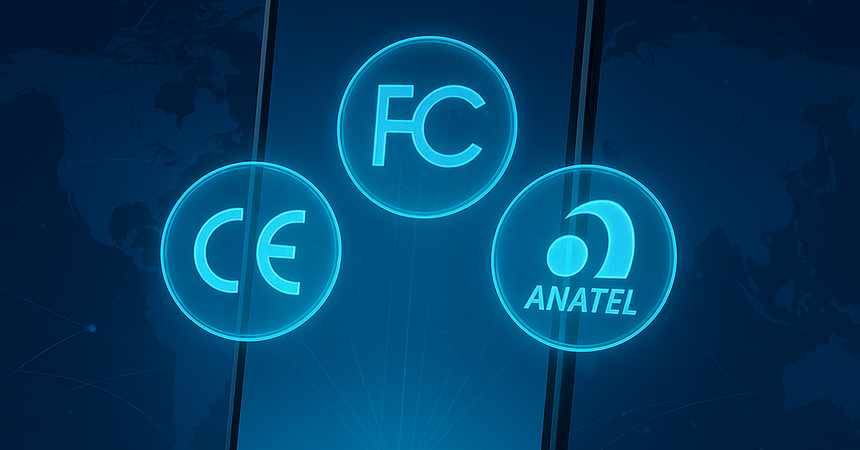Electronics and telecom equipment manufacturers entering global markets face three key certification systems:
- CE (Europe),
- FCC (United States),
- Anatel (Brazil).
CE: Access to the European Market
- What it is: A mark of conformity with EU directives (notably the RED directive for radio and telecom equipment).
- Who applies: The manufacturer or its authorized representative in the EU.
- Testing: Conducted in accredited European laboratories.
- Documents: Technical dossier, declaration of conformity, test reports.
- Key point: CE ensures compliance with safety, electromagnetic compatibility, and radio spectrum requirements.
FCC: Access to the U.S. Market
- What it is: Certification by the Federal Communications Commission.
- Who applies: The manufacturer or its U.S. representative.
- Testing: Mandatory tests in FCC-accredited labs in the United States.
- Documents: Test protocols, device schematics, user manuals.
- Key point: Emphasis on radio frequency emissions and electromagnetic compatibility.
Anatel: Certification in Brazil
- What it is: Mandatory certification by the National Telecommunications Agency (Agência Nacional de Telecomunicações).
- Who applies: Only a local representative in Brazil.
- Testing: Conducted exclusively in accredited laboratories within Brazil.
- Documents: Full technical dossier, ISO certificates, manuals translated into Portuguese.
- Key point: CE and FCC reports may be considered but cannot replace Anatel certification.
Key Takeaways for Exporters
1. No single certificate covers all markets.CE is required for Europe, FCC for the U.S., and Anatel for Brazil.
2. Procedures vary in scope and responsibility.
In the EU and U.S., manufacturers can initiate the process directly; in Brazil, only through a local representative.
3. Certification timelines differ.
- CE and FCC: approx. 4–6 weeks.
- Anatel: up to 3–4 months.
In Brazil, all documents must be in Portuguese, and testing must be conducted locally.
Conclusion
CE, FCC, and Anatel are three distinct certification systems that govern access to Europe, the United States, and Brazil. Exporters must account for differences in timing, documentation, and the role of local representatives. Proper preparation prevents costly delays and ensures smooth market entry.WorldWideBridge supports manufacturers across all three certifications — CE, FCC, and Anatel. We handle documentation, organize testing, and deliver turnkey certification so your products can freely enter Europe, the U.S., and Brazil.
